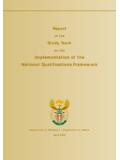Transcription of THE LABOUR COURT OF SOUTH AFRICA, CAPE …
1 REPUBLIC OF SOUTH AFRICA Reportable Of interest to other judges THE LABOUR COURT OF SOUTH AFRICA, CAPE TOWN JUDGMENT Case no: C 685/16 In the matter between: Sandile NGOBENI Applicant and COMMISSION FOR GENDER EQUALITY Respondent Heard: 20 November 2017 Delivered: 29 November 2017 SUMMARY: LRA s 64(4) individual employee alleging unilateral change to terms and conditions of employment. Employee does not rely on specific performance or breach of employment contract in terms of s 77(3) of BCEA. LABOUR COURT lacking jurisdiction. JUDGMENT STEENKAMP J Page 2 Introduction [1] This case deals, once again, with the vexed question of the remedy if any available to an individual employee faced with an alleged unilateral change to terms and conditions of employment.
2 Background facts [2] The applicant, Mr Sandile Ngobeni, was employed by the respondent, the Commission for Gender He was employed as an assistant dir ector: policy and research , initially in Braamfontein; but his contract of employment stipulated: You may be required to carry out duties assigned to you at such other locations as the commission may determine and shall, if so required, be expected to travel to destinations designated by the commission in order to attend to your duties. You may also be required to relocate to different premises, subject to consultation in this regard, and cannot unreasonably refuse such a transfer if based on operational requirements of the commission.
3 [3] The employee s initial employment was not confirmed after a probationary period. He appealed. The appeal panel recommended that he be reinstated into his position as senior researcher. In January 2016 the parties agreed that, due to operational requirements, he would relocate to the parliamentary office in Cape Town to continue his duties as a senior researcher on the same terms and conditions of employment. (His wife had also relocated to Cape Town). [4] The employee whose wife had, in the interim, returned to Gauteng now contends that the Commission has unilaterally changed his terms and conditions of employment.
4 His main complaint is that his duties now include legal research and the drafting of legislative submissions to parliament. But in a meeting held with him in September 2015 to discuss the relocation, he had indicated his satisfaction with the explanation that the drafting was research based; and that other employees such as Ms 1 Ironically, all of its legal representatives were male. Page 3 Lisa Vetten and Mr Sam Waterhouse are researchers by profession but often write legislative submissions to parliament. [5] The applicant referred a dispute to the CCMA in terms of s 64 of the LABOUR Relations Act2.
5 On 10 October 2016 the CCMA issued a certificate of outcome, indicating that the dispute concerning s 64(4) unilateral change to terms and conditions of employment -- remained unresolved. The Commissioner ticked the box indicating that it should be referred to this COURT . [6] The employee did so. In his statement of claim, he described the legal issues that arise as follows: Section 64(4) unilateral change to terms and conditions of employment and unfair LABOUR practice with regard to employer entity and the employee . [7] After pleadings had closed, the matter was set down for hearing on 20 November 2017.
6 On 21 August 2017 I issued a directive in the following terms, mero motu: The parties must address the COURT on jurisdiction at the commencement of the hearing. [8] At the commencement of the hearing, neither party did so. Mr Ngobeni was no longer represented by his erstwhile attorney; and although he had received the directive and he indicated from the bar that he had been receiving advice from an attorney at Legal Aid SA, he had not prepared any submissions. And the Commission s counsel indicated that, inexplicably, his attorney had not received the directive. In those circumstances, everyone was agreed that I would hear the evidence; and that the parties would address me on jurisdiction as well as the merits at the end of the trial.
7 [9] Mr Ngobeni testified, was cross examined, replied, and closed his case. The Commission closed its case without leading any evidence. The parties addressed the COURT in argument after the lunch adjournment. 2 Act 66 of 1995 (the LRA). Page 4 Jurisdiction [10] Section 64(4) of the LRA reads: Any employee who or any trade union that refers a dispute about a unilateral change to terms and conditions of employment to a council or the Commission in terms of subsection (a) may, in the referral, and for the period referred to in subsection (1)(a) (a) require the employer not to implement unilaterally the change to the term and condition of employment; or (b) if the employer has already implemented the change unilaterally, require the employer to restore the terms and conditions of employment that applied before the change.
8 [11] The problem with this provision is that it acts as a holding operation to restore the status quo ante; the normal remedy if the employer does not comply, is for a trade union to strike. But what is an individual employee to do? [12] This COURT commented on this conundrum in Du Randt v In that case, conciliation having failed, the employee sought the following relief by way of application: 1. Directing the respondents to reinstate his terms and conditions in full; 2. Directing the respondents to pay him all amounts due to him in terms of those conditions of employment; and 3. An interdict preventing the respondents from further unilaterally amending his terms and conditions of employment.
9 [13] The COURT noted:4 The difficulty that the employee faced when conciliation failed, is that the relief envisaged for employees and trade unions in those circumstances is strike action. Counsel for both parties appeared to be ad idem that a single employee cannot strike, but neither of them could cite any authority for that proposition. Yet such authority does exist. In Schoeman v Samsung Electronics SA (Pty) Ltd 5 Landman J held that an individual employee 3 Du Randt v Ultramat SOUTH Africa (Pty) Ltd [2013] 6 BLLR 573 (LC); (2013) 34 ILJ 2228 (LC). 4 Paras 27-28. 5 [1997] 10 BLLR 1364 (LC) at 1367. Page 5 cannot strike.
10 And I agree with the view of the learned authors in LABOUR Law through the Cases6 that the contrary view expressed in Co-operative Worker Association v Petroleum Oil & Gas Co-operative of SA 7 is not consistent with the characterisation of strike as concerted action. In these circumstances, a single employee would normally still have the remedy of specific performance available to him. But in this case, the employee advised and assisted by his attorneys clearly nailed his colours to the mast of an unfair LABOUR practice in terms of s 186(1)(a) of the LRA. He asserted that he had been demoted. Given that assertion, he has an alternative remedy, to refer an unfair LABOUR practice dispute to the CCMA in terms of s 191(1)(a) of the LRA.
















